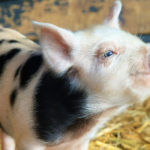
Challenging Tyson Foods Over Deceptive ‘Net-zero’ and ‘Climate-smart’ Beef Claims
Environmental Working Group v. Tyson Foods, Inc.
The Environmental Working Group (EWG), filed a lawsuit against Tyson Foods, Inc., the second largest meat company in the U.S. and the world, accusing the company of making false or misleading marketing claims targeting D.C. consumers concerned about climate change.
Next Step
November 12, 2025 Update: The D.C. Superior Court denied Tyson Foods, Inc.’s motion to dismiss the case. In its order, the court found that EWG’s allegations were sufficient to support a claim that Tyson’s net-zero emissions campaign and climate smart beef products were false or misleading to environmentally conscious consumers. The court held that Tyson’s aspirational “Net-Zero by 2050” and “climate-smart beef” statements were not only actionable under the D.C. Consumer Protection Procedures Act, but that EWG had sufficiently pled that Tyson lacked both a practical plan and had not taken sufficient steps to achieve its publicized goals.
On September 18, 2024, the EWG, represented by Animal Legal Defense Fund, Earthjustice, Edelson PC, and FarmSTAND, filed a lawsuit against Tyson Foods, Inc., the second largest meat company in the U.S. and the world, accusing the company of making false or misleading marketing claims targeting D.C. consumers concerned about climate change.
The Environmental Working Group filed the suit under the District of Columbia Consumer Protection Procedures Act, or CPPA, in D.C. Superior Court. The suit targets Tyson’s marketing claims that its industrial meat production operations will reach net-zero greenhouse gas, or GHG, emissions by 2050 and that it produces “climate-smart” beef.
The lawsuit seeks to stop Tyson from continuing to make these false and misleading environmental claims. The groups are calling for Tyson to retract its misleading statements and to be held accountable for violating the CPPA.
Industrialized meat production generates a tremendous volume of climate-warming emissions at every stage of the process—from deforestation and overgrazing, to feed production; and from enteric and manure emissions to slaughter and distribution. Industrial beef has a larger climate footprint than any other major food product. Tyson, which produces about 20 percent of U.S. beef, chicken and pork, has GHG emissions that exceed those of Austria or Greece. Its beef production is responsible for 85 percent of the company’s emissions.
Despite the enormous scale of Tyson’s emissions, for over three years, Tyson has been promoting a supposed commitment to achieve net-zero emissions by 2050. And for over a year, it has marketed “climate-smart beef” that isn’t even yet available on the market. As the lawsuit alleges, Tyson’s 2022 annual revenues exceed $53 billion, and yet its spending on GHG reduction practices is less than $50 million dollars, which amounts to less than 0.1 percent of its revenue. Tyson spends about eight times as much on advertising as it does on research. Tyson is aware that consumers have an interest in—and are willing to pay more for—climate-friendlier foods, and the company is trying to capitalize on this by taking credit for progress it has not made and has no serious plans to achieve.
According to the lawsuit, Tyson’s net-zero and “climate-smart” beef claims are false or misleading. Tyson’s GHG emissions are enormous, and the company has never tried to fully measure them or has not made any detailed inventory public. Tyson omits key sources of emissions from its public GHG emissions accounting, including land use and land use change associated with grazing and animal feed production. There is no credible evidence that Tyson intends to make any significant changes to its current activities.
Who is being sued, why, and under what law?
Tyson Foods, Inc. Is being sued under the District of Columbia Consumer Protection Procedures Act (CPPA) over its claims that its industrial meat production operations will reach net-zero greenhouse gas, or GHG, emissions by 2050 and that it produces “climate-smart” beef. The lawsuit seeks to stop Tyson from continuing to make these unsubstantiated environmental claims and hold the company accountable for violating the CPPA.
What court is the lawsuit filed in? District of Columbia Superior Court
Why this action is important: Growing public awareness of climate change and its causes have led consumers to demand more sustainable, environmentally friendly products. However, nowhere is the greenwashing of food production more misleading than in the beef industry. Raising cows for human consumption is an unavoidably climate-intensive process, and is by no reasonable metric “climate-smart.” Despite this, FSIS approved the first beef product label from Tyson containing such a claim. Yet, its beef production is responsible for 85 percent of the company’s emissions. It’s important to stop Tyson from capitalizing on consumers’ interest in climate-friendly foods as it tries to take credit for progress it has not made and has no serious plans to achieve.
Sign Up!
Join the Animal Legal Defense Fund's email list to stay up to date on lawsuits, legislation, and regulations affecting animals.

